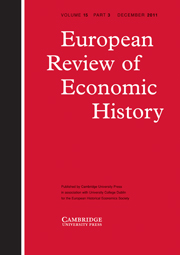Article contents
The 1935 Sanctions against Italy: Would coal and oil have made a difference?
Published online by Cambridge University Press: 07 September 2006
Abstract
This article assesses the hypothesis that the implementation of sanctions on the export of coal and oil products to Italy by the League of Nations in 1935–36 would have forced Italy to abandon her imperialistic war against Ethiopia. An analysis of the data on coal consumption in the industrial census of 1937–38 shows that Italian industry would have survived a League embargo on coal, provided that Germany continued her supply to Italy. However, the counterfactual on oil and oil derivatives proves that Italy was vulnerable to an oil embargo which included oil residuals (the main input for the petrochemical industries using oil cracking as a refining method), and fuel oil. Therefore, a solitary attempt at such an embargo by the League could have been successful even with only a limited collaboration by the United States in the form of maintaining exports to Italy at ‘peacetime levels’ for each commodity embargoed by the League.
- Type
- Articles
- Information
- Copyright
- Cambridge University Press 2000
- 10
- Cited by


